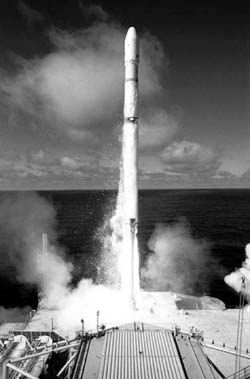Ukrainian rockets could have averted Armageddon
Zhytomyr hosts the 6th International Scientific-Practical Conference “Man and Outer Space”
The 6 th International Scientific- Practical Conference “Man and Outer Space” aroused great interest among scientists in various fields as well as aerospace specialists from Ukraine and Russia not least of all because it was pegged to a very important date — the 100 th birth anniversary of Sergei Koroliov, the outstanding designer of rocket and space systems, which will be observed on Jan. 12, 2007. The fact that the conference took place in Zhytomyr was also significant, as the distinguished scientist was born in this city.
The topics of the papers read at the conference included Koroliov’s unquestionably significant role in space exploration, views on man’s place in the universe, practical aspects of space research, and its links with globalization processes. Eduard Kuznetsov, Deputy Director-General of the National Space Agency of Ukraine, went so far as to declare that the late 20th and early 21st centuries are the age of Koroliov. Kuznetsov is convinced that in the 15 years of independence Ukraine has managed not just to preserve but to boost its achievements in the field of space technologies, such as receiving information from outer space, protecting the atmosphere, launching earth satellites, etc. Some speakers regretted that certain rocket systems had been discarded. For example, Oleh Mashkov, a department chief at the Higher Certification Commission of Ukraine, who has worked in this sphere for many years, said it was wrong to dismantle the strategic missile launch silos in Ukraine. He claims they could have been used to launch a “space shield” against large meteorites that are approaching our planet. By hitting such targets with long-range missiles, we could have averted a potential Armageddon, if huge meteorites fell to earth.
Col.-Gen. Ivan Oliinyk, advisor to the director-general of the M. K. Yanhel State Design Bureau, noted that it would be a good idea to revive some forgotten programs once developed at this bureau, for example, unmanned orbiting stations and the use of synchronized orbit for monitoring our planet from space, owing to the worsening of the earth’s environmental condition. He also insisted that if Russia and Ukraine are to enter worldwide globalization, they should actively cooperate rather than compete in selling space technologies, as is often the case now. The two countries should share profits instead of dividing markets.
Oliinyk admitted, however, that it is political factors rather than economic ones that often stand in the way of cooperation, and there are forces in Russia’s ruling circles that do not support joint efforts in this field. This authoritative expert’s approach could be regarded as completely logical if not for the following factor: the process of cooperation always raises the question of evaluating the contribution of each side to joint projects and, accordingly, the distribution of risks and profits, which usually results in conflict. And in conflicts it is very often the politically stronger side, rather than the one that has more consequential rights, that gains the upper hand. When asked by The Day if there is a danger that space technologies might slip into the hands of terrorist groups, which are increasingly forming the heart of a global confrontation with the civilized world, Oliinyk replied that this danger really exists. Thus, states that have these technologies should, to a reasonable degree, limit other countries from developing this kind of potential. At the same time, he cannot accept the intention of some states, such as the US, that want to choose who will and who will not work in outer space. The conference was noticeably suffused with nostalgia for the days when Ukrainian and Russian scientists and engineers worked together on various projects during the Soviet period. This is only natural because this type of cooperation bound them together better than any ideology. But it is also clear that, as new generations of specialists are emerging, this nostalgia will diminish and competition between them will become more acute. As for the humanitarian component of space exploration, the conference participants were almost unanimous in their view that by exploring outer space, people are trying to reconsider their place in the universe, learn about themselves, and discover the reason why they emerged in the boundless stellar expanses, i.e., to grasp the meaning of their existence. The only question is whether someone will manage to do this somewhere, anywhere, now or if ever.






